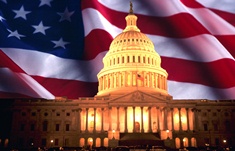Andrea Neal of the Indiana Policy Review Foundation penned the following column on right-to-work laws for the Times of Northwest Indiana. The Indiana Chamber has been an advocate for developing a right-to-work law in the state:
It doesn’t take an economist to spot the common thread in these recent economic development headlines:
• Chattanooga, Tenn., July 29: "Volkswagen hires 2,000th employee."
• Shreveport, La., July 28: "NJ-based bag manufacturer to build Louisiana plant."
• Decatur, Ala., July 21: "Polyplex to build $185 million plant."
• West Point, Ga., July 7: "Kia builds vehicle No. 300,000."
All four stories have Southern datelines. All come from states with right-to-work laws, which prohibit labor contracts that require employees to join a union or pay a union representation fee.
This is the issue that prompted the five-week House Democratic walkout during the 2011 Indiana General Assembly. The Democrats — a minority in both House and Senate — had no other leverage. So when a right-to-work bill came up unexpectedly in a session that was supposed to be about the budget, redistricting and education, they bolted. Republicans capitulated and took the legislation off the table.
In 2012, it will return with a vengeance, and this time Democrats can’t avoid it. Right-to-work has been promised a full public airing. The Interim Study Committee on Employment Issues, chaired by Sen. Phil Boots, R-Crawfordsville, is taking a first crack this summer and hopes to recommend a bill by November. Gov. Mitch Daniels, who didn’t support the bill last session, has hinted he might this time around.
The debate goes back to 1935 when Congress passed the National Labor Relations Act protecting employees’ rights to form, join and be involved in unions. One section of the law permitted contracts that made union membership a condition of employment. Congress modified that language in 1947 when it said states could prohibit these. In response, 22 states passed right-to-work laws. Indiana is one of 28 that currently does not have such a law.
Predictably, at last week’s study committee hearing, business interests favored right-to-work while union leaders opposed it. The economists were divided. Richard Vedder, of Ohio University, summarized research showing that right-to-work states have higher rates of employment, productivity and personal income growth. Marty Wolfson, of the University of Notre Dame, testified that right-to-work laws result in lower wages and benefits.
Their conclusions are not mutually exclusive. If you grant Wolfson’s point, the policy question remains: Which is better? A state with higher wages for some but a weaker economy overall or one with lower wages for some and more vibrant growth, not to mention freedom of choice for the worker?
Companies are voting with their feet. To the extent that manufacturers are expanding in the United States — and few are — they are choosing the South and West where right-to-work is prevalent.
Alabama Gov. Robert Bentley, in announcing the $185 million project by Polyplex, the world’s fourth-largest manufacturer of thin polyester film, was blunt: "Alabama is a right-to-work state, and we will continue to be one. That’s one of our advantages for companies who are looking to build on new sites."
Companies won’t readily admit this because what they say can and will be used against them. Currently pending at the National Labor Relations Board is a case against Boeing, which recently opened a second production facility in South Carolina for its 787 Dreamliner airplane.
South Carolina has a right-to-work law. Boeing’s other production site is in Washington state, which does not. The board’s complaint alleges that Boeing chose South Carolina in retaliation for strikes by Washington workers in violation of the National Labor Relations Act. Its proposed remedy would force Boeing to move its South Carolina operation to Washington. This would be an extraordinary use of federal power to promote the cause of organized labor at one company’s expense.
Right-to-work does not destroy unions. It gives workers the right to decide for themselves whether to join. "This greater accountability results in unions that are more responsive to their members and more reasonable in their wage and work rule demands," the Mackinac Center for Public Policy said.
It should come as no surprise to Indiana legislators that expanding industries favor that kind of relationship. The legislative choice is between protecting unions as we know them or protecting the long-term interests of Hoosier workers.
 Federal highway funding is running low. Nothing new there. The Indiana Chamber, and many others, have called for long-term solutions from Washington instead of short-term fixes that simply extend the uncertainty.
Federal highway funding is running low. Nothing new there. The Indiana Chamber, and many others, have called for long-term solutions from Washington instead of short-term fixes that simply extend the uncertainty.
 For politicos, Indiana's 2012 U.S. Senate primary and election had it all: Drama. Faction rivalries. Gaffes. But if it was up to some legislators, the ultimate victor would not be left up to the general voting public.
For politicos, Indiana's 2012 U.S. Senate primary and election had it all: Drama. Faction rivalries. Gaffes. But if it was up to some legislators, the ultimate victor would not be left up to the general voting public.
 The Medicaid expansion decision for each state is one of several critical aspects of the Affordable Care Act, which was recently deemed Constitutional by the Supreme Court. Although federal dollars are at stake, it’s not a given that states (including Indiana) will agree to the changes to the program for low-income residents.
The Medicaid expansion decision for each state is one of several critical aspects of the Affordable Care Act, which was recently deemed Constitutional by the Supreme Court. Although federal dollars are at stake, it’s not a given that states (including Indiana) will agree to the changes to the program for low-income residents.  Texas Gov. Rick Perry raised a few eyebrows this spring with comments that were intrepeted as a secession threat. In brief, he said: "We’ve got a great union. There’s absolutely no reason to dissolve it. But if Washington continues to thumb their nose at the American people, you know, who knows what might come out of that."
Texas Gov. Rick Perry raised a few eyebrows this spring with comments that were intrepeted as a secession threat. In brief, he said: "We’ve got a great union. There’s absolutely no reason to dissolve it. But if Washington continues to thumb their nose at the American people, you know, who knows what might come out of that.".jpg) Avery Jukes is a basketball player at Butler University. Being a key player off the bench for an always competitive and sometimes overachieving program would normally be enough to define a young person during his or her college days.
Avery Jukes is a basketball player at Butler University. Being a key player off the bench for an always competitive and sometimes overachieving program would normally be enough to define a young person during his or her college days. The U.S. Chamber’s
The U.S. Chamber’s